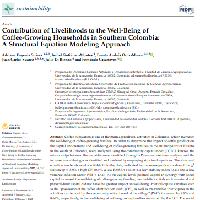Resumen
- Coffee cultivation is one of the main agricultural activities in Colombia, which increases the well-being of coffee-growing families. In order to determine the impact of coffee production, the capital endowment and well-being of coffee-growing families in the municipality of Pitalito, in the south of Colombia, were analyzed using the community capital index (CCI). Likewise, the relationships between the variables were identified through a Pearson correlation analysis, and the increase in well-being was identified and modeled by employing structural equations. The structural equation model showed a suitable fit to the data, indicated by the non-significant value of the χ2 statistic (p = 0.85), a high CFI (0.97), a low RMSEA (<0.001), a low stability index (0.23) and a low variance inflation factor (VIF = 1.42). At the capital level, political capital in synergy with social capital increased the well-being of coffee-growing families; meanwhile, capitals such as natural and physical-built capital did not have the greatest impact on well-being. Political capital variables such as the “possession of the coffee identification card” (CPI), as well as the variable “participates in the activities carried out by the community action board of the village” (PAC), increased by 9.9% and 8.66%, respectively, in the well-being of coffee-growing families measured by the CCI. The social capital variables that boosted the CCI were the benefits of the National Federation of Coffee Growers (FNC) (BFN, %V(variation): 8.32) and associativity (Aso, %V: 7.51). Other variables that make up human capital with high incidence in the CCI were family size (FSi) and the number of people who can read in the family (FLE) with a variation of 9.12% and 8.6%, respectively. However, other variables such as labor cost for disease management (CDM) and labor cost for harvesting (HCL) had no significant effect on the variation of the CCI. It was found that the level of well-being increases due to variables such as associativity and participation in grassroots organizations in the community, such as being a member of the National Federation of Coffee Growers, a quality represented by the possession of a coffee identification card that, in synergy with other variables, reduce inequality and poverty.
